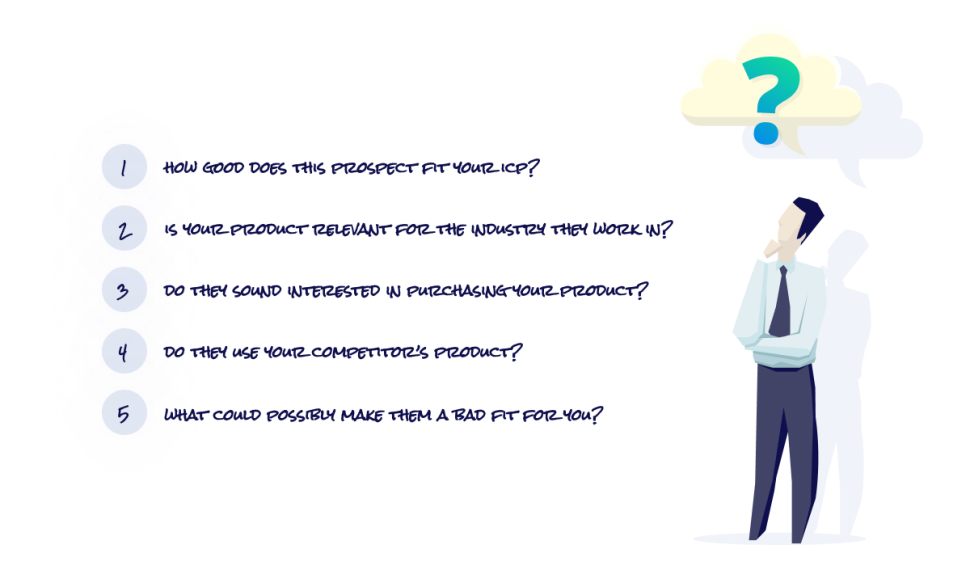Truebase Blog
Valuable information from industry professionals
Questions to ask and avoid during a sales discovery call

Wissam Tabarra
Jan 26

One thing is common in getting your first date and closing a deal - you have to begin with discovering whether a potential relationship exists between you and the prospect. That’s where discovery calls come handy in B2B sales.

A discovery call is the first conversation with your sales prospect to build a potential sales relationship. Also, the discovery call reveals a lot about the prospect's needs. Reps generally qualify their new leads to learn whether they fit their ideal customer profile. Sometimes 50% of the prospects are not a good fit, and if you entertain them, you are wasting time and leaving all the money on the table. Discovery calls with your prospects have two goals. You can start a relationship by qualifying prospects and finding the sales opportunity or abandon the prospects by disqualifying them. The reason behind having intro calls is to make sure that you don’t waste time and energy on unqualified leads. In short, learn everything you need to ask on a discovery call to uncover your prospects and leave an everlasting impression on them.
Aim of Sales Discovery Call
The goal of having a discovery call is to make your prospects feel comfortable and evaluate their interest in your product or service. Here is what you should aim at while getting on a call.
Identifying prospects’ needs and pain points.
You cannot prescribe medicine to someone who is perfectly fine. Similarly, you cannot pitch products and services to leads with no interest or pain points. The purpose of the discovery call is to find the pain points and problems of your prospects by asking relevant questions to avoid turning your discovery call into a cold call.
Create a relationship of trust with prospects.
When a new lead shows interest in scheduling a discovery call, this is your chance to connect with them and understand them better. The first call is a way to make an emotional bond with your lead if you can keep the call going in the right direction. If they feel that you understand them, you have a better chance of converting them into customers.

Determine if they are a good fit for you and vice versa.
Putting the right set of questions in sequence will help you determine if your prospect is looking for a solution from you. Being a sales rep, you should have a strong knowledge of your product and services to introduce your product to the “good fit” prospect.
Even after discovery calls, sales reps end up having no sales or low conversation rates. The root cause is some sales reps do not follow a proper structure to stay focused and miss out on crucial aspects. They turn their intro call into cold calling without focusing on asking for valuable information from prospects, eventually losing time that could have been spent on prospects who are more likely to convert.
In the discovery call, what questions can create a false negative?
When doing discovery calls, false negatives(improper disqualification) prop up every now and then. It goes something like this - a rep schedules a call with a prospect and asks ambiguous questions leading to an unqualified lead. Later, some other rep hits the account again and finds out that the account was disqualified improperly.
Usually, this happens when reps ask questions like “Do you like this product?”, “Are you looking to buy something like this?” Mostly, prospects who don’t have the proper buying power will respond in the negative and those who do might not be ready to answer you. This way salespeople cannot show the customer value of their products and services. Below are some questions you must avoid during a sales discovery call with potential clients.
Would you be interested in this?
Would you be interested in buying this product or service?
How much would you pay for it?
20-30 minutes of a discovery call are so important, and you should utilize them to gather the information for customizing your offering to your prospects.Don’t waste your discovery call trying to sell in it, instead use it to find the best prospects from your outreach campaigns.
When to ask the qualification-oriented questions?
Qualification-oriented questions are essential when conducting a sales discovery call. These should be asked in the early stages of a sales cycle. The purpose of these questions is to assess the customer's needs, budget, timeline, and decision-making process. By asking qualification questions during the call, you can quickly determine if the prospect is a good fit for your product or service.
To obtain the customers you're trying to get, you need to be aware of what precisely you are searching for. Prior to presenting qualifying inquiries, you need to guarantee that the potential customer is the type of customer you want to assist.

What questions to avoid during a discovery call?
When you earn the privilege to get your lead on a discovery call, you should avoid the below-mentioned disasters.
Avoid showing the demo of your product:
Never combine your discovery call with your product demo! A sales discovery call should not be pulped with a product demonstration. It should help you decide whether your prospect needs to see your product or service or whether you need to invest your time somewhere else.
Never ask close-ended questions
Avoid asking questions that invite one-word answers like “Yes/NO”. Many sales reps make this deadly mistake and then lack the opportunity and miss out on the pain nuggets. If you are a sales rep, you should ask probing questions to get more information. Instead of asking, "Do you face [specific problems]", you can ask "What do you think are some challenges that your team currently faces??”
Ditch the below questions today
How much will it cost if you don't resolve the issues?
Are you looking for [specific] solutions?
Sometimes, prospects don’t have defined problems, and asking them about them and what it may cost them sounds irritating.
What questions to ask in a discovery call?
When doing a discovery call, start with setting the stage and understanding the basics about the prospect before you move on to the qualification questions. Do not fail to understand your prospect's business objectives and how your product or service can be the right solution to enhance their crucial metrics. Asking powerful questions that are open-ended, purposeful, and curious can give you new insights as prospects tend to pour out detailed information to such questions.
Have a look at some questions that set the stage.
Start with a warm welcome:
Asking your prospect about their day is a nice gesture. So, ask them about their day in the first 2-3 minutes to lay a strong foundation for your further call. Make sure to keep the introduction contextual and don’t pose personal questions. Ask them about their company?
As a sales rep, your goal is to ask questions that give your prospect a chance to spill out information about themselves. This way, they can elaborate on everything on their terms, and you can craft your follow-ups based on their story itself.
What are the success metrics used by your team?
As a sales rep, when you ask them about the success tracking metrics, you demonstrate how significant team statistics can boost and encourage them to contemplate the effects on themselves. An enhancement in any key metrics is a win-win situation for the team, not exclusively the product. Can you help me understand your biggest challenge?
When you ask about the biggest roadblocks, it shows them you focus on their needs. Moreover, the information will help you understand how your product or service can provide the solution. What kind of results do you expect from a new solution?
Asking about their expectations gives you a reality check on whether your solution can be a Godsend for them. It uncovers more information about them.
What’s the most important priority for you in this? And why is that?
If you want to get to the core of the situation, asking these direct questions where prospects can elaborate more is good. The response that the prospects give, alongside why they chose it, will help you to move the deal quickly. In short, you can concentrate on what's most crucial for them and how your product can help.
What is your timeline for achieving these goals?
You should ask them how soon they want to implement the solutions and achieve their business goals. As a good sales rep, you should always make sure to exceed expectations to avoid dismay.
Qualification oriented questions Sales qualification is the only way to know whether your prospect is a good fit or not. So, here are a few sales qualification questions to ask your prospects. Do you have any previous experience dealing with this issue?
This question will help you map out if the prospect has tried addressing this issue prior. If your potential lead has tried dealing with it and remains unsuccessful, it is your turn to make them familiar with your product. Moreover, this could be an opportunity to unveil what went wrong previously. What concerns do the other stakeholders have?
Your prospect may not be the only decision-maker in the organization. Therefore, to avoid chaos later, you should ask about the concerns of other stakeholders. Find out if your proposed solution might create problems for other decision-making authorities. If possible, try to get other stakeholders in another call, possibly a demo to eliminate concerns early on in the sale cycle.
Who is responsible for overseeing the budget?
An expert sales rep would ask the prospects how much they are willing to spend. This is a vital step in the prospect qualification process. Moreover, you should know about the decision-makers and the economic-buyers. In one year, how do you hope things will be different if you implement this solution? It is always better to play safe and identify everything from their expectations to budget at early stages. Are you looking into any other solutions? After knowing that your prospect is also looking for other solutions, you can get a chance to beat the competition. When do you plan to make a decision? At last, after asking all the above questions, you must ask them about their decision-making plan. A qualified prospect is serious about making decisions and implementing solutions. To ensure your prospect makes a quick decision, add value to every touchpoint.
Close more deals with great discovery calls.
In the end, it is all about adding value and asking relevant questions to understand your prospect. Moreover, effective intro calls are effortless and feel like normal two-way communication. So, choose the right questions to ace your intro call and close the deal.
Time to launch into your AI prospecting journey
Try it for freeProspect Faster. Connect smarter
© Truebase Inc, 2023. All rights reserved.